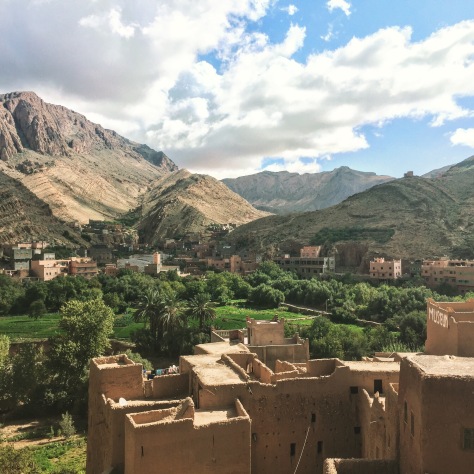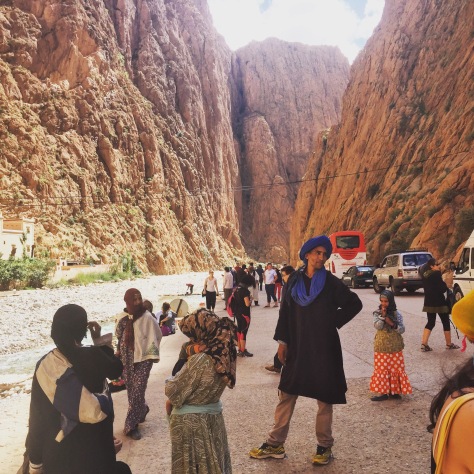Or a fool and his money.
The Berber people, or at least those I’ve met along my travels, have been by and large exceedingly effervescent. Seemingly predisposed to a certain charisma, playful natures and an almost sardonic humour.
Combine this with a Moroccan education in at least Arabic and French and you have yourself a truly formidable salesperson seemingly made for the tourist trade. When talking to them it quickly becomes clear that Berber is a byword for quality in everything from camel-wool djellabas to Clipper lighters.
Many things in Morocco seem, to the pessimist, to run on commission or gratuities. At least that would be a nice way to say it. I prefer to think the wheels are greased with back-handers.
Do you really want to study the idiosyncrasies of the of the Moroccan economy? Book yourself into one many of the tours offered at pretty much every hostel. Or, if you’re hell-bent on propping up the tourist industry, just talk to one of the nice men who accost you in the medina.
The tours really are all the same, quite literally, I would be surprised if there is more than one or two tour operators working in any given city with a multitude of touts and hostels. One thing is for sure; if you’re told to be ready for seven in the morning, don’t be surprised when you aren’t on the bus at nine.
The white coaches, each emblazoned with ‘touristique‘ for ease of identification by the local chancers, aren’t awful. If you’re lucky you’ll get air conditioning. Less lucky and you get windows that open. If not then good luck, there is a surprising amount of open space and no-one is in any sort of rush.
When the bus does eventually stop you’ll no doubt find yourself at some dusty roadside cafe where your driver and the owner seem on suspiciously good terms. The food won’t be terrible but the price will bring a tear to the eye, be prepared to pay city prices in the middle of nowhere.
Many of the tour guides are Berber, multilingual and excellent at what they do. Unfortunately much of the charm comes from associated tradition and once you realise its cargo pants and garish, yellow trainers under the standard issue djellaba some of the shine inevitably wears off.
En route to Aït Benhaddou we collect our guide, Rashid, and stop to take a tour of his home village. An earthen-clay construction next to the river it is the very picture of a quaint lifestyle that time has forgotten. Hidden children shout and wave from behind wrought iron windows.

Temporarily sun-blinded we stumble through twisting paths, stairs and alleys that lead us over step-worn cobblestones, smooth as glass, to one of the tallest structures in this labyrinthine dwelling.
‘Now,’ announces Rachid. ‘You will be invited into our home for traditional Berber hospitality. No charge.’
The dwelling is a huge three-story affair, which, for what is essentially a mud hut, is really quite big enough. As we are led to the second floor I can’t help but notice another fifteen-or-so pairs of assorted walking boots and trainers on the first floor landing.
After taking our own fifteen-or-so pairs of shoes off we find ourselves perched on the finest Chinese, mass-produced stools that line four walls of the room. The neon coloured plastic chairs clash garishly with the carpets hung up and patently on display.
The final wall is dominated by a huge loom. Hunched in front of this ancient contraption is a wizened old woman carefully weaving wool between the tensioned weft threads and paying absolutely no heed to the tourists whatsoever. The overall effect is quite beguiling.
I take a seat closest to the loom just as our host enters. An older man clearly of Berber stock he greets us with a tray of mint tea and each a fond ‘amrehba sisswène.’
‘Welcome to our home,’ he begins. ‘You will forgive me if I speak only Berber English. We have great pride in our hospitality which is why we give everyone tea who visits!’
It’s at about this point that if you look closely you will not be able to help but notice the thick layer of dust on the loom and the fact the elderly operator is making scant progress in her task.
The monologue carries on whilst we drink and ranges from the interesting; certain colours of ink only cure properly under the light of a full moon. Through the questionable; camels only give wool once in a lifetime. Down to the outright romantic; you will only find tassels at one end of a true Berber carpet for this is where the story ends.

Every carpet in every style is proffered around the entire room for inspection before being piled in the centre. Only the best quality from the best materials. Feel the weight, the weave, the textures.
So there you are, tea has been drunk, hospitality graciously accepted and now it’s time for the hard sell. But these carpets are such exquisite works of craftsmanship you simply don’t have the money on you. You wouldn’t dare cause insult with a trifling offer.
‘It is ok, my friend. I offer you best price because you buy straight from me. Student prices!’ he smiles. ‘Thanks to the Bank of Morocco supporting our small village, we now accept American Express!’
But you are travelling and these carpets, these woven works of art, are of such quality they must be heavy. Far too cumbersome to lug on and off crowded busses and the additional luggage fee is enough to make you shudder at the thought.
‘Ah but yes!’ the old man assures you. ‘In modern times as we are, we also offer international delivery. All this from our little village and insured too. You buy now and carpet waiting for you at home.’
I imagine the success rate on this well executed little scheme is plenty high enough to justify the Bank of Morocco’s investment. But not this time. Crestfallen in the face of his own failure, nobody is going to blame you if you slip him ten dirham for the hospitality as you leave. I know I did.
By the time you do reach the ancient kasbah, and UNESCO world heritage site, of Aīt Benhaddou you could be forgiven for feeling a little jaded. Yes it remains, to this day, inhabited by 11 traditional, once nomadic families. And yes, the head of each may have up to four wives. But upon finding that the two iconic main gates were built to order by the local film-making industry you’ll feel the pessimism creeping back in.
I’d happily recommend a trip to anyone. So maybe it was just the sun or the numerous tat stalls or the prospect of yet another shitty, tourist-price potato tagine. But by the time I’d returned to the minibus a hundred miles of gawping through the window at nothing but desert came as quite the relief.
